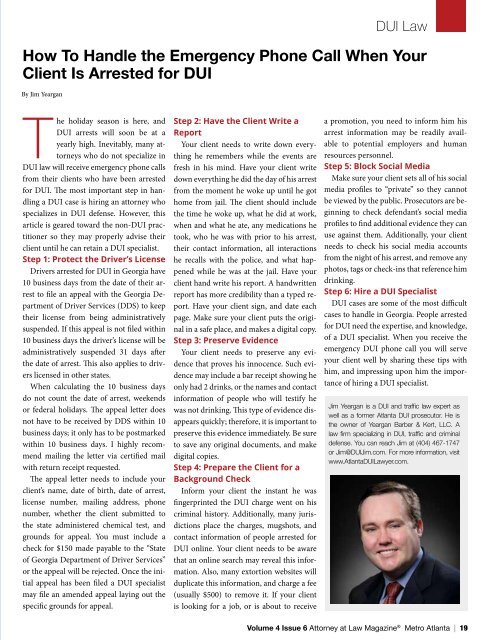AAL_ATL_#6_P3
You also want an ePaper? Increase the reach of your titles
YUMPU automatically turns print PDFs into web optimized ePapers that Google loves.
How To Handle the Emergency Phone Call When Your<br />
Client Is Arrested for DUI<br />
By Jim Yeargan<br />
DUI Law<br />
The holiday season is here, and<br />
DUI arrests will soon be at a<br />
yearly high. Inevitably, many attorneys<br />
who do not specialize in<br />
DUI law will receive emergency phone calls<br />
from their clients who have been arrested<br />
for DUI. The most important step in handling<br />
a DUI case is hiring an attorney who<br />
specializes in DUI defense. However, this<br />
article is geared toward the non-DUI practitioner<br />
so they may properly advise their<br />
client until he can retain a DUI specialist.<br />
Step 1: Protect the Driver’s License<br />
Drivers arrested for DUI in Georgia have<br />
10 business days from the date of their arrest<br />
to file an appeal with the Georgia Department<br />
of Driver Services (DDS) to keep<br />
their license from being administratively<br />
suspended. If this appeal is not filed within<br />
10 business days the driver’s license will be<br />
administratively suspended 31 days after<br />
the date of arrest. This also applies to drivers<br />
licensed in other states.<br />
When calculating the 10 business days<br />
do not count the date of arrest, weekends<br />
or federal holidays. The appeal letter does<br />
not have to be received by DDS within 10<br />
business days; it only has to be postmarked<br />
within 10 business days. I highly recommend<br />
mailing the letter via certified mail<br />
with return receipt requested.<br />
The appeal letter needs to include your<br />
client’s name, date of birth, date of arrest,<br />
license number, mailing address, phone<br />
number, whether the client submitted to<br />
the state administered chemical test, and<br />
grounds for appeal. You must include a<br />
check for $150 made payable to the “State<br />
of Georgia Department of Driver Services”<br />
or the appeal will be rejected. Once the initial<br />
appeal has been filed a DUI specialist<br />
may file an amended appeal laying out the<br />
specific grounds for appeal.<br />
Step 2: Have the Client Write a<br />
Report<br />
Your client needs to write down everything<br />
he remembers while the events are<br />
fresh in his mind. Have your client write<br />
down everything he did the day of his arrest<br />
from the moment he woke up until he got<br />
home from jail. The client should include<br />
the time he woke up, what he did at work,<br />
when and what he ate, any medications he<br />
took, who he was with prior to his arrest,<br />
their contact information, all interactions<br />
he recalls with the police, and what happened<br />
while he was at the jail. Have your<br />
client hand write his report. A handwritten<br />
report has more credibility than a typed report.<br />
Have your client sign, and date each<br />
page. Make sure your client puts the original<br />
in a safe place, and makes a digital copy.<br />
Step 3: Preserve Evidence<br />
Your client needs to preserve any evidence<br />
that proves his innocence. Such evidence<br />
may include a bar receipt showing he<br />
only had 2 drinks, or the names and contact<br />
information of people who will testify he<br />
was not drinking. This type of evidence disappears<br />
quickly; therefore, it is important to<br />
preserve this evidence immediately. Be sure<br />
to save any original documents, and make<br />
digital copies.<br />
Step 4: Prepare the Client for a<br />
Background Check<br />
Inform your client the instant he was<br />
fingerprinted the DUI charge went on his<br />
criminal history. Additionally, many jurisdictions<br />
place the charges, mugshots, and<br />
contact information of people arrested for<br />
DUI online. Your client needs to be aware<br />
that an online search may reveal this information.<br />
Also, many extortion websites will<br />
duplicate this information, and charge a fee<br />
(usually $500) to remove it. If your client<br />
is looking for a job, or is about to receive<br />
a promotion, you need to inform him his<br />
arrest information may be readily available<br />
to potential employers and human<br />
resources personnel.<br />
Step 5: Block Social Media<br />
Make sure your client sets all of his social<br />
media profiles to “private” so they cannot<br />
be viewed by the public. Prosecutors are beginning<br />
to check defendant’s social media<br />
profiles to find additional evidence they can<br />
use against them. Additionally, your client<br />
needs to check his social media accounts<br />
from the night of his arrest, and remove any<br />
photos, tags or check-ins that reference him<br />
drinking.<br />
Step 6: Hire a DUI Specialist<br />
DUI cases are some of the most difficult<br />
cases to handle in Georgia. People arrested<br />
for DUI need the expertise, and knowledge,<br />
of a DUI specialist. When you receive the<br />
emergency DUI phone call you will serve<br />
your client well by sharing these tips with<br />
him, and impressing upon him the importance<br />
of hiring a DUI specialist.<br />
Jim Yeargan is a DUI and traffic law expert as<br />
well as a former Atlanta DUI prosecutor. He is<br />
the owner of Yeargan Barber & Kert, LLC. A<br />
law firm specializing in DUI, traffic and criminal<br />
defense. You can reach Jim at (404) 467-1747<br />
or Jim@DUIJim.com. For more information, visit<br />
www.AtlantaDUILawyer.com.<br />
Volume 4 Issue 6 Attorney at Law Magazine ® Metro Atlanta | 19










